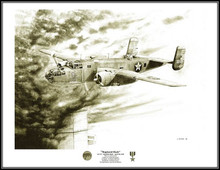 Loading... Please wait...
Loading... Please wait...Categories
 New Products
New Products
-
"Balloon Buster Extraordinaire" by S. Stokes (signed FDC by Willy Coppens) ~ 35% Off ~ Free Shipping
$695.00$451.75
-
$1,995.00$1,296.75
-
$995.00$646.76
-
$2,195.00$1,426.75
-

Our Newsletter
- Home
- Lmtd/Opn Edtns ~ 40% Off~ Free Shipping
- The "Ruptured Duck" by Lonnie Ortega ~ 40% Off ~ Free Shipping
Product Description
Print Size: 13" x 17" ~ 650 print Limited Edition signed by: the Artist. Comes with a COA.
Col. Dean Davenport, the co-pilot of the World War II bomber crew whose role in the Doolittle raid over Japan was recounted in the book and movie "Thirty Seconds Over Tokyo".On the morning of April 18, 1942, a group of 16 Army Air Forces B-25 bombers, under the command of Lt. Col. James H. Doolittle, took off from the aircraft carrier Hornet for a low-level, daylight bombing attack that brought the war to the Japanese homeland for the first time.The raid resulted in minimal damage to military and industrial sites, but lifted the spirits of an American home front reeling from the Japanese attack on Pearl Harbor. It forced the Japanese to take costly defensive measures and brought Doolittle the Medal of Honor. The seventh plane to depart from the Hornet was the Ruptured Duck, flown by First Lt. Ted W. Lawson and his co-pilot, Second Lieutenant Davenport. They flew the twin-engine bomber 700 miles to Tokyo, bombed a steel plant, then headed for an airstrip in China. The 16 bombers, without enough fuel to return to the Hornet, were supposed to land at airfields in parts of China that had not fallen to the Japanese. But they ran into a storm, and most of the 80 crewmen bailed out or crash-landed. Three died and eight were captured by Japanese troops. Three of the captives were executed and one died of dysentery. The Ruptured Duck crashed at night in the East China Sea, a quarter-mile from a beach where its pilots had tried to land. Lieutenants Lawson and Davenport, strapped into their seats, were catapulted through the plane's windshield as it sank in shallow water. Lieutenant Lawson suffered a gashed leg and facial injuries and Lieutenant Davenport had a fractured leg and a concussion, but the pilots and the other three crewmen swam to the beach.They were found by Chinese guerrillas, and over the next seven weeks were carried in chairs, rickshaws and trucks until being rescued by an Army Air Forces plane that took them to India. The crewmen flew on to the United States and, with other returning Doolittle fliers, received the Distinguished Flying Cross from Gen. Henry Arnold, commander of the Army Air Forces.The ordeal of the Ruptured Duck's crew was recounted in 1943 by the newly promoted Captain Lawson in "Thirty Seconds Over Tokyo" (Random House), written while he was convalescing from the amputation of his left leg. The book described the moment when the battered lieutenants found each other on the Chinese beach: "Speaking, and the sight of each other, seemed to bring us further along toward complete consciousness and both of us began to moan, standing there next to each other in the black rain." Lieutenant Davenport was a technical adviser for the 1944 movie "Thirty Seconds Over Tokyo," in which he was portrayed by Tim Murdock, and he flew a B-25 bomber off a pier in Santa Monica, Calif., in a scene depicting the departure from the Hornet. Dean Davenport, born in Spokane, Wash., grew up in Oregon and was a pre-law student when he joined the armed forces. He remained in the service after World War II and returned to combat in the Korean War, flying 86 missions as a fighter pilot. He retired as a colonel in 1967. In addition to the Distinguished Flying Cross, he was awarded the Silver Star and the Legion of Merit.
Warranty Information
null






